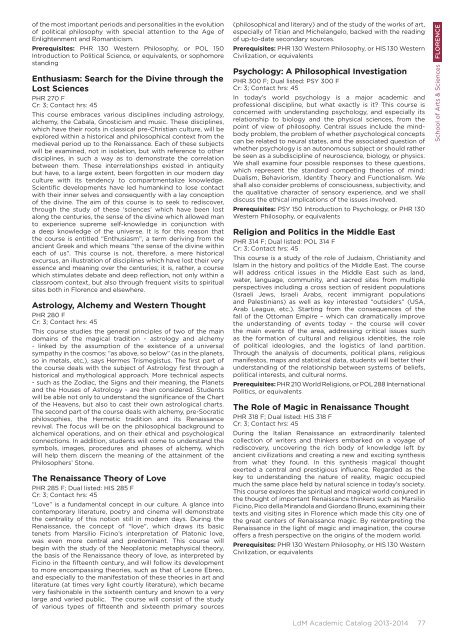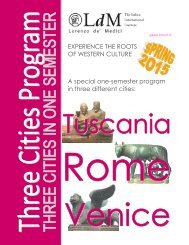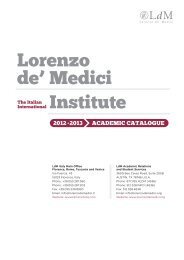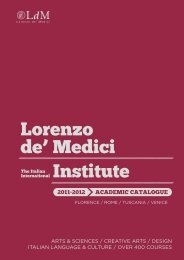aCademiC Catalog 2013-2014 - Lorenzo de Medici
aCademiC Catalog 2013-2014 - Lorenzo de Medici
aCademiC Catalog 2013-2014 - Lorenzo de Medici
Create successful ePaper yourself
Turn your PDF publications into a flip-book with our unique Google optimized e-Paper software.
of the most important periods and personalities in the evolution<br />
of political philosophy with special attention to the Age of<br />
Enlightenment and Romanticism.<br />
Prerequisites: PHR 130 Western Philosophy, or POL 150<br />
Introduction to Political Science, or equivalents, or sophomore<br />
standing<br />
Enthusiasm: Search for the Divine through the<br />
Lost Sciences<br />
PHR 270 F<br />
Cr: 3; Contact hrs: 45<br />
This course embraces various disciplines including astrology,<br />
alchemy, the Cabala, Gnosticism and music. These disciplines,<br />
which have their roots in classical pre-Christian culture, will be<br />
explored within a historical and philosophical context from the<br />
medieval period up to the Renaissance. Each of these subjects<br />
will be examined, not in isolation, but with reference to other<br />
disciplines, in such a way as to <strong>de</strong>monstrate the correlation<br />
between them. These interrelationships existed in antiquity<br />
but have, to a large extent, been forgotten in our mo<strong>de</strong>rn day<br />
culture with its ten<strong>de</strong>ncy to compartmentalize knowledge.<br />
Scientific <strong>de</strong>velopments have led humankind to lose contact<br />
with their inner selves and consequently with a lay conception<br />
of the divine. The aim of this course is to seek to rediscover,<br />
through the study of these ‘sciences’ which have been lost<br />
along the centuries, the sense of the divine which allowed man<br />
to experience supreme self-knowledge in conjunction with<br />
a <strong>de</strong>ep knowledge of the universe. It is for this reason that<br />
the course is entitled “Enthusiasm”, a term <strong>de</strong>riving from the<br />
ancient Greek and which means “the sense of the divine within<br />
each of us”. This course is not, therefore, a mere historical<br />
excursus, an illustration of disciplines which have lost their very<br />
essence and meaning over the centuries; it is, rather, a course<br />
which stimulates <strong>de</strong>bate and <strong>de</strong>ep reflection, not only within a<br />
classroom context, but also through frequent visits to spiritual<br />
sites both in Florence and elsewhere.<br />
Astrology, Alchemy and Western Thought<br />
PHR 280 F<br />
Cr: 3; Contact hrs: 45<br />
This course studies the general principles of two of the main<br />
domains of the magical tradition - astrology and alchemy<br />
- linked by the assumption of the existence of a universal<br />
sympathy in the cosmos: “as above, so below” (as in the planets,<br />
so in metals, etc.), says Hermes Trismegistus. The first part of<br />
the course <strong>de</strong>als with the subject of Astrology first through a<br />
historical and mythological approach. More technical aspects<br />
- such as the Zodiac, the Signs and their meaning, the Planets<br />
and the Houses of Astrology - are then consi<strong>de</strong>red. Stu<strong>de</strong>nts<br />
will be able not only to un<strong>de</strong>rstand the significance of the Chart<br />
of the Heavens, but also to cast their own astrological charts.<br />
The second part of the course <strong>de</strong>als with alchemy, pre-Socratic<br />
philosophies, the Hermetic tradition and its Renaissance<br />
revival. The focus will be on the philosophical background to<br />
alchemical operations, and on their ethical and psychological<br />
connections. In addition, stu<strong>de</strong>nts will come to un<strong>de</strong>rstand the<br />
symbols, images, procedures and phases of alchemy, which<br />
will help them discern the meaning of the attainment of the<br />
Philosophers’ Stone.<br />
The Renaissance Theory of Love<br />
PHR 285 F; Dual listed: HIS 285 F<br />
Cr: 3; Contact hrs: 45<br />
“Love” is a fundamental concept in our culture. A glance into<br />
contemporary literature, poetry and cinema will <strong>de</strong>monstrate<br />
the centrality of this notion still in mo<strong>de</strong>rn days. During the<br />
Renaissance, the concept of “love”, which draws its basic<br />
tenets from Marsilio Ficino’s interpretation of Platonic love,<br />
was even more central and predominant. This course will<br />
begin with the study of the Neoplatonic metaphysical theory,<br />
the basis of the Renaissance theory of love, as interpreted by<br />
Ficino in the fifteenth century, and will follow its <strong>de</strong>velopment<br />
to more encompassing theories, such as that of Leone Ebreo,<br />
and especially to the manifestation of these theories in art and<br />
literature (at times very light courtly literature), which became<br />
very fashionable in the sixteenth century and known to a very<br />
large and varied public. The course will consist of the study<br />
of various types of fifteenth and sixteenth primary sources<br />
(philosophical and literary) and of the study of the works of art,<br />
especially of Titian and Michelangelo, backed with the reading<br />
of up-to-date secondary sources.<br />
Prerequisites: PHR 130 Western Philosophy, or HIS 130 Western<br />
Civilization, or equivalents<br />
Psychology: A Philosophical Investigation<br />
PHR 300 F; Dual listed: PSY 300 F<br />
Cr: 3; Contact hrs: 45<br />
In today’s world psychology is a major aca<strong>de</strong>mic and<br />
professional discipline, but what exactly is it? This course is<br />
concerned with un<strong>de</strong>rstanding psychology, and especially its<br />
relationship to biology and the physical sciences, from the<br />
point of view of philosophy. Central issues inclu<strong>de</strong> the mindbody<br />
problem, the problem of whether psychological concepts<br />
can be related to neural states, and the associated question of<br />
whether psychology is an autonomous subject or should rather<br />
be seen as a subdiscipline of neuroscience, biology, or physics.<br />
We shall examine four possible responses to these questions,<br />
which represent the standard competing theories of mind:<br />
Dualism, Behaviorism, I<strong>de</strong>ntity Theory and Functionalism. We<br />
shall also consi<strong>de</strong>r problems of consciousness, subjectivity, and<br />
the qualitative character of sensory experience, and we shall<br />
discuss the ethical implications of the issues involved.<br />
Prerequisites: PSY 150 Introduction to Psychology, or PHR 130<br />
Western Philosophy, or equivalents<br />
Religion and Politics in the Middle East<br />
PHR 314 F; Dual listed: POL 314 F<br />
Cr: 3; Contact hrs: 45<br />
This course is a study of the role of Judaism, Christianity and<br />
Islam in the history and politics of the Middle East. The course<br />
will address critical issues in the Middle East such as land,<br />
water, language, community, and sacred sites from multiple<br />
perspectives including a cross section of resi<strong>de</strong>nt populations<br />
(Israeli Jews, Israeli Arabs, recent immigrant populations<br />
and Palestinians) as well as key interested “outsi<strong>de</strong>rs” (USA,<br />
Arab League, etc.). Starting from the consequences of the<br />
fall of the Ottoman Empire – which can dramatically improve<br />
the un<strong>de</strong>rstanding of events today – the course will cover<br />
the main events of the area, addressing critical issues such<br />
as the formation of cultural and religious i<strong>de</strong>ntities, the role<br />
of political i<strong>de</strong>ologies, and the logistics of land partition.<br />
Through the analysis of documents, political plans, religious<br />
manifestos, maps and statistical data, stu<strong>de</strong>nts will better their<br />
un<strong>de</strong>rstanding of the relationship between systems of beliefs,<br />
political interests, and cultural norms.<br />
Prerequisites: PHR 210 World Religions, or POL 288 International<br />
Politics, or equivalents<br />
The Role of Magic in Renaissance Thought<br />
PHR 318 F; Dual listed: HIS 318 F<br />
Cr: 3; Contact hrs: 45<br />
During the Italian Renaissance an extraordinarily talented<br />
collection of writers and thinkers embarked on a voyage of<br />
rediscovery, uncovering the rich body of knowledge left by<br />
ancient civilizations and creating a new and exciting synthesis<br />
from what they found. In this synthesis magical thought<br />
exerted a central and prestigious influence. Regar<strong>de</strong>d as the<br />
key to un<strong>de</strong>rstanding the nature of reality, magic occupied<br />
much the same place held by natural science in today’s society.<br />
This course explores the spiritual and magical world conjured in<br />
the thought of important Renaissance thinkers such as Marsilio<br />
Ficino, Pico <strong>de</strong>lla Mirandola and Giordano Bruno, examining their<br />
texts and visiting sites in Florence which ma<strong>de</strong> this city one of<br />
the great centers of Renaissance magic. By reinterpreting the<br />
Renaissance in the light of magic and imagination, the course<br />
offers a fresh perspective on the origins of the mo<strong>de</strong>rn world.<br />
Prerequisites: PHR 130 Western Philosophy, or HIS 130 Western<br />
Civilization, or equivalents<br />
School of Arts & Sciences FLORENCE<br />
LdM Aca<strong>de</strong>mic <strong>Catalog</strong> <strong>2013</strong>-<strong>2014</strong><br />
77





